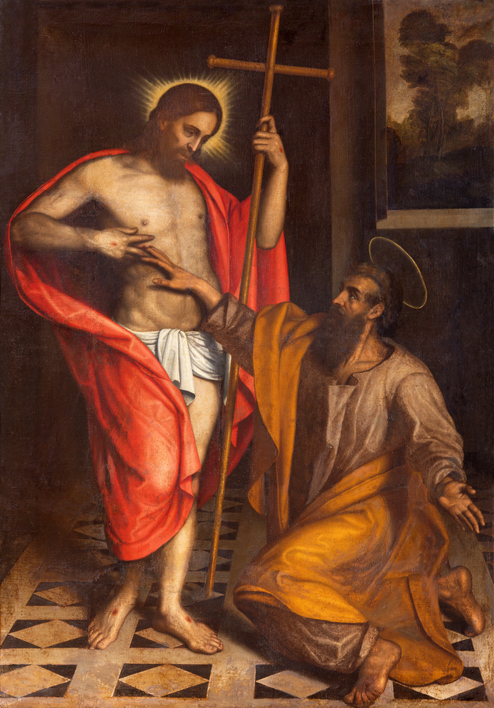Rather than do an exhaustive study of the word “faith” and all those varying degrees, I want to focus mainly on one degree today: the important one. The one that we are saved by. To do that, I will have to appropriate a little perspective.
I BELIEVE IN GOD
To start with, let’s take James. He is known for his faith arguments. In his letter, he set forth a neat little argument. He said, “You believe that God is one; you do well. Even the demons believe—and shudder!” (James 2:19, emphasis mine).
It reminds me of an article I wrote recently: I believe in God, but… The article makes a different point, but the title gets me there. People say to me, yeah, I believe in God, but I don’t (air quotes) ‘practice’ my faith. Ironically, whatever degree of faith someone has, they can still call it “their faith.” Oh well, I didn’t make the rules.
Anyway, here we see one use of the word “believe”: I believe in God, just not enough to—you know, go to church and marry my girlfriend and all that. They say they don’t ‘practice’ their faith. I have one. I just don’t use it. I have a blackbelt; I just prefer to take my chances and maybe get my butt kicked cause it’s easier, so I don’t ‘practice’ my blackbelt. Or something like that.
Sadly, many feel that since they believe in God, God will send them to (air quotes) ‘heaven’ when they die. It’s sad because the Bible explains that it takes more belief than that. Not more in size. More in content. More on that in a minute.
Here’s what James means: you believe God is one (something doctrinally important that we would have to cover in a different article); you do well. In other words—good for you. Bless your pointy little head. Demons also believe that. Satan also believes that.
While we’re at it, Satan and his team all know that God and Jesus exist beyond the shadow of a doubt (Lk 4:34, 41; Mt 8:31; Act 19:15). We can assume that demons have first-hand experience in this area. By a show of hands, how many think the demons will go to heaven someday? Exactly.

I’m not saying you’re a demon for not going to church. Only a fallen angel can be a demon. I’m saying that the belief James is referring to here is just intellectual ascent. That is part of it; it’s just the easy part, and it’s not enough.
Christianity isn’t easy. If it seems easy, you’re likely doing it wrong. A death is required, and not just Jesus’ death, either. Is it me or did it just get really quiet in here? See my article on repentance.
I BLAME THE CHURCH
Here’s the thing: if you’ve spent any time on my blog before, you know that I’m a big advocate for attending a local church. I write about how and why and all that. This weird thing happens to a preacher when he preaches, though. If no one ever comes to hear him preach, he can’t call himself a preacher anymore.

What many, many preachers don’t talk about is the difficult stuff. The important stuff. The eternity stuff. They dependably send you off in under 45 minutes with a smile on your face and a song in your heart, never late for lunch or the game, just so long as you’ll come back next week. You can get a donut and a cup of coffee when you get there, but when you leave, there are no changed lives, there’s no conviction, and there is weak faith.
Have you ever seen a weak faith? It looks like this: I grew up in the church, but then I kind of (air quotes) ‘grew’ out of it. Or I ‘tried’ church, but it didn’t ‘take.’ You can just leave up the air quotes for that one.
PLEASE OPEN YOUR BIBLES
So where does that leave us? Faith. Saving faith. Let’s start with the standard. Open your Bibles to the Book of Hebrews, Chapter Eleven.
Now faith is the assurance of things hoped for, the
conviction of things not seen. (Hebrews 11:1)
In verse one, we get a definition. Again, we can’t rest on intellectual ascent here, but it’s a good place to start. Please bear with me as I break it down like English class for a minute.

The book of Hebrews was written by—any guesses? That’s right, a Hebrew. To the Hebrews, by the way. So, the poetic device used here was familiar to the author and, more importantly, the audience.
It’s okay, it’s okay. Don’t cry. Shh. Shh. I’m not going to say any Hebrew words.
The writer is using a familiar Hebrew poetic device called parallelism. He said the same thing in two ways to drive home the point. Interestingly, the sum becomes more intense than the two points on their own, which is the point. Stay with me; this will be over soon.
The first point that the writer (which I keep saying because the author of Hebrews is not known) is making is this. He says “faith” is:
the assurance of things hoped for
So, we have a noun, “assurance.” We not only believe, we’re assured. We’re convinced. We have no doubts. We may have questions, but the questions are only there to fill in the things we don’t understand. The questions do not serve any sort of doubt.
But what do we have assurance of? Ah hah! Here is the part that matters—the object of our faith. In the context of our sentence diagram, the assurance is in things hoped for.
What are we hoping for? Everything that God promised. Everything that God advised. Not just the things that we agree with. Not just the things we like but the things that freak us out, too. If we’re not freaked out by some of these things, by the way, it’s because we lack faith in them. Eternal damnation, anyone?
The writer’s parallel point is that “faith” is:
the conviction of things not seen
So, what does that mean? Why can’t we see these things? Because they happened at a different time or haven’t happened yet. They have been assured to us, promised to us, prophesied to us by God. God is the source of our hope. He is the source of our conviction. He is the source of our faith. In other words, If God said it, we can trust it.

God has already given us every reason we need to trust that everything He has said will come to pass. How? Because 100% of what He said would come to pass by now has come to pass.
The New Testament contains the Gospel accounts and tutelage about living the Christian life resulting from the Gospel. According to www.blueletterbible.org, the Old Testament is quoted or alluded to over 880 times in the New Testament, almost 250 times in the book of Revelation alone. The Old Testament is also referred to over 200 times in the Gospel accounts.
Said a different way, the reason God has already given us to accept, trust, believe, and have hope in His promises is prophecy.
PROPHECY
So, where is all of this assurance and conviction supposed to come from? Are you telling me my salvation depends on my ability to conjure specific attitudes out of thin air? No, not at all. As always, God gave us everything we need. How did He do that? One way is through His prophecies.
Prophecies are funny. We like to identify them and draw links between Old Testament prophecies and New Testament fulfillment. We want to weigh the number of prophecies (like I just did) to say that if someone fulfilled that many prophecies, He has to be the Guy.
However, what can go unnoticed during all this weighing is that God had been promising since not long after the dawn of time that He would send a Messiah… and He did.
We can have faith, assurance, and conviction in EVERYTHING that God tells us because everything that He has said would happen by now has happened. So, we can have confidence that everything He said will happen at some time in the future will also happen.

God told the serpent in the third chapter of Genesis that He would send a Seed of the woman to bruise the serpent’s head. That’s Jesus, by the way. This verse is called the protoevangelium—the first occurrence of the Gospel in Scripture.
I will put enmity between you and the woman, and between your offspring and her offspring; he shall bruise your head, and you shall bruise his heel. (Genesis 3:15)
ABRAHAM
God told Abram (later Abraham) that he would have a great many descendants (the Jews), and through those descendants, all nations would be blessed. That’s Jesus, by the way.
And I will make of you a great nation, and I will bless you and make your name great, so that you will be a blessing. I will bless those who bless you, and him who dishonors you I will curse, and in you all the families of the earth shall be blessed. (Genesis 12:2-3)
Then the LORD said to Abram, “Know for certain that your offspring will be sojourners in a land that is not theirs and will be servants there, and they will be afflicted for four hundred years. But I will bring judgment on the nation that they serve, and afterward they shall come out with great possessions. As for you, you shall go to your fathers in peace; you shall be buried in a good old age. And they shall come back here in the fourth generation, for the iniquity of the Amorites is not yet complete.” (Genesis 15:13-16)
In these prophetic books, God proved to the original audience, who did see many of these prophesies come to pass, that He is faithful. In the process, He has proven to us, who have seen even more of these prophecies come to pass, that all He says He will do will always come to pass. He is worthy of our faith. He has earned it.
I have heard the excuse (and made it myself) that faith was easier for Abraham. God spoke directly to Abraham—a lot. I think it would be easier to believe God if you got a command at total volume from God: in the sky, ground shaking. God is there. He’s real. I might have peed a little. Can you imagine Abraham chilling out in front of his tent, napping?
GOD: “Abraham!” Startled birds suddenly take flight.
ABRAHAM: Out of breath, heart pounding, “Yeah?”
GOD: “I am God!”
ABRAHAM: “Okay?” Sweating now.
GOD: “I want you to pack everything and move!”
ABRAHAM: Relieved, “You betcha.”
GOD: “I’m serious!”
ABRAHAM: hurriedly, “Okay. Here we go. See? This is me moving.”
GOD: “I’m God!”
ABRAHAM: a little louder, “Okay. Okay. I get it. You’re God. I’m old. I’ll do whatever you say.”

But that isn’t what was so impressive about Abraham’s faith. He was 100, his wife was 90. She could never have children and had probably gone through the (air quotes) ‘change of life’ more than 50 years ago. Abraham was surprised, but he never doubted God when God told him he would father a great nation.
Here’s the big payoff. God’s first promise came true. They had a baby boy. Little Isaac. God kept His promise. Abraham hadn’t doubted it before, but now he had receipts. Now, he could hold his baby up to his doubting neighbors and say, “See?”

He probably did not share his act of confidence with the neighbors he had bragged to, much less Sarah. The text doesn’t tell us. He may have trusted God but probably doubted everyone else would understand.
Unfortunately, what is one of the most brilliant pictures of faith is often used as an argument for disbelief or even hatred of God. As a former atheist, I speak from experience here; what kind of God requires you to sacrifice your son to show your loyalty? Or so the argument goes.
We have a context issue here. If framed improperly, I had to admit, it can make God look bad. So, let’s frame it properly.
God had promised Abraham that a great many descendants would descend from Isaac. Abraham believed that. That faith was counted to him as righteousness, God’s righteousness, not his own (Phil 3:9).
God tested Abraham’s faith (not his loyalty) in this promise God had (already) made. Think about it. Abraham believed these promises God had made to him even though he would never live to see them all come to fruition. God blessed him for that faith. God gave Abraham His own righteousness for his faith.
Then, He tested the faith. God wasn’t surprised by what Abraham did. God can’t be surprised (Isa 46:9-10; John 6:64). He’s all-knowing. But He was able to prove Abraham’s faith, probably to Abraham but definitely to me, that Abraham was faithful. It was like God said, Oh yeah? You believe I’ll give you many descendants through Isaac? Prove it. Go ahead and kill him if you believe me.

By faith Abraham, when he was tested, offered up Isaac, and he who had received the promises was in the act of offering up his only son, of whom it was said, “Through Isaac shall your offspring be named.” He considered that God was able even to raise him from the dead, from which, figuratively speaking, he
did receive him back. (Hebrews 11:17-19)
Maybe God would resurrect Isaac. Maybe Isaac would be unharmed altogether. Abraham didn’t know how God would pull this off, but he had faith that God would pull it off. Even though Abraham couldn’t see how, the how did not matter because of the Who.
The point is that Abraham believed God would pull it off. He trusted in God’s previous promise. Nothing else God asked him to do, even if it seemed to negate that promise, would un-do that promise. Abraham had hope in that promise. He had conviction.
So, faith in God is easy, right? Of course not. As I said earlier, Christianity is not easy. It’s simple, but it is not easy. And, faith is a foundational component of Christianity:
For by grace you have been saved through faith. And this is not your own doing; it is the gift of God. (Ephesians 2:8-9)
But let’s be fair. It could be said that we have advantages that Abraham did not have. Sure, God was dealing personally and directly with Abraham. Still, Abraham was being told to believe in things coming to pass (involving children his elderly barren wife hadn’t had yet) hundreds of years into the future. Then, after giving Abraham a child, God told him to kill it. Though God was doing the asking, He was still asking a lot.
We don’t have the luxury of God’s audible and, therefore, convincing voice making these promises the way Abraham did, but we do have these promises, and countless others, in the past tense that were made by God that were kept. We have millennia of hindsight. On balance, a good argument could be made that we have more reason to trust in God’s promises than Abraham did.
But when Christ had offered for all time a single sacrifice for sins, he sat down at the right hand of God, waiting from that time until his enemies should be made a footstool for his feet. For by a single offering he has perfected for all time those who are being sanctified. (Hebrews 10:12-14)
In the seventh chapter of the Gospel of Luke, a ‘sinful woman’ was on the floor at Jesus’ feet, crying and wiping His feet with her tears and hair. A Pharisee was disappointed in Jesus because this woman was a known sinner. To everyone’s surprise, Jesus told the woman her sins were forgiven. Then He told her that her faith had saved her and to go in peace (Luke 7:36-50).
Another time, while Jesus and His disciples were leaving Jericho, a blind beggar heard Jesus was coming and called out, “Jesus, Son of David, have mercy on me!” Jesus healed his blindness and told him, “Go your way; your faith has made you well” (Mark 10:46-52).
For this is the will of my Father, that everyone who looks on the Son and believes in him should have eternal life, and I will raise him up on the last day.” (John 6:40)
He needed to touch Jesus again for himself. Once he could touch Jesus and His wounds, Thomas believed, but Jesus used this lesson to give us our last beatitude, “Have you believed because you have seen me? Blessed are those who have not seen and yet have believed” (John 20:19-29).

When they asked Jesus why they failed:
He said to them, “Because of your little faith. For truly, I say to you, if you have faith like a grain of mustard seed, you will say to this mountain, ‘Move from here to there,’ and it will move and nothing will be impossible for you.” (Matthew 17:20)
Even if they had just a tiny mustard-seed-sized faith in what He had promised, the fact that it was He who was promising meant that it would come true… so long as they had faith in it.
Even if they had a tiny mustard-seed-sized faith in the fact that a mountain would move if they told it to, so long as Jesus said it would, then the size of their faith did not matter, only the object of their faith. But there needed to be faith and not doubt.
An additional word of caution. Our faith does not contain any power, per se. It merely appropriates God’s power to the believer. It is the object of the faith, the thing one has faith in that has all the power (Rom 4:5).
Additionally, this faith is not a one-and-done. It must be an ongoing thing. You can’t give up.
And you, who once were alienated and hostile in mind, doing evil deeds, he has now reconciled in his body of flesh by his death, in order to present you holy and blameless and above reproach before him, if indeed you continue in the faith, stable and steadfast, not shifting from the hope of the gospel that you heard, which has been proclaimed in all creation under heaven, and of which I, Paul, became a minister. (Colossians 1:21-23, emphasis mine)
WHY SHOULD I?
If your spouse told you that they loved you and proved it with their actions, wouldn’t you develop a tendency to believe them when they said to you that they loved you? Even if they don’t have a perfect record, the longer-lasting marriages will often be based on such proof, and the ensuing faith, trust, and maybe even conviction will undergird the whole marriage.
Ladies, what if your husband says, if I take out the trash every week for twenty years, you can have faith that I won’t forget to take it out next week? If I work the same job six days a week for twenty-five years to keep food on the table, you can rest assured that I’ll keep doing it. Not too tall an order, right?
That is what God is saying to us—through Jesus, in Scripture. He has married us, but He does have a perfect record, so we can trust Him.
Imagine God saying, through Jesus, if I told you that I would send a Messiah to save you, then sent Him, you can have faith that when I ask you to:
- feed, clothe, and visit the least of these (Matt. 25:35-40),
- love your enemies and pray for those who persecute you (Matt. 5:44),
- forgive EVERYONE (Matt 6:14-15),
- run a good race (1 Cor. 9:24; 2 Tim. 4:7-8; Heb. 12:1),
- endure till the end (Matt. 24:13; Rev. 2:10),
- understand that I discipline you because I love you (Ps 94:12; Ps 119:75; Heb. 12:6; Rev. 3:19),
The conviction of that can undergird us. The knowledge of that and the faith in that will drive our actions and our decisions and the way we interact with the world and the least of these and our neighbors and our enemies… until the end, when we will be given crowns and be allowed to return them to the crowns’ giver, praise God, and amen.
Scripture quotations are from the ESV® Bible (The Holy Bible, English Standard Version®), copyright © 2001 by Crossway, a publishing ministry of Good News Publishers. Used by permission. All rights reserved.

